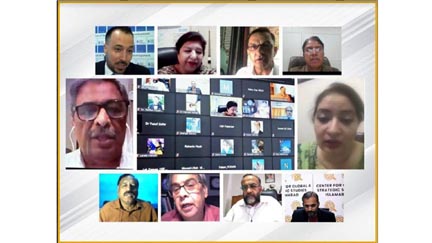ISLAMABAD, JUN 2: Online
Roundtable Discussion on "Climate Change as Non-Traditional Security
Challenge: Relevance for Pakistan" was held in Islamabad, on Wednesday.
It was jointly organized by
Center for Global and Strategic Studies (CGSS), Islamabad and Hanns Seidel
Foundation (HSF) Pakistan.
Shakeel Ramay Advisor, Asian
Institute of Eco-civilization Research and Development, Consultant SDPI &
Member board of Advisors, CGSS, commenced the session with opening remarks.
Dr. Steffen Kudella, Resident
Representative, Hanns Seidel Foundation, Pakistan gave the welcome remarks. He
welcomed all the participants and distinguished panelists.
Dr.Kudella highlighted that on
5th June 2021, Pakistan is hosting the international Environment Day. Last year
this day was hosted by Germany and Colombia.
Dr. Kudella said that it is
important for Pakistan to raise awareness on climate change and mitigate its
negative impacts.
He stated that climate change is
both, the rise of the average temperature of the Earth’s climate system and
also large-scale weather shifts.
It is one of the most threating situations
for Pakistan. These non-traditional security
challenges are non-militaryin nature, but risks to the survival and well-being
of people.
Dr. Kudella stated that the
rising temperatures are leading to the melting of glaciers in Pakistan.
Moreover, they lead to a degradation of ecosystems, impact biodiversity, and
cause desertification and flooding, which in turn can cause serious problems
such as mass migration, starvation or poverty.
He emphasized on the importance
of holding these roundtables to address critical issues.
Ms. Romina Khurshid Alam, Member
of the National Assembly of Pakistan and Former Secretary of Climate Change
Ministry stated that climate change is a subject on which we all need to work
cohesively.
She said that pollution has also
increased in this pandemic and explained that Pakistan has the Climate
Committee and is working to mitigate the negative impacts of climate change.
She suggested that in this regard
think tanks can play an important role in policy orientation process and
Government should implement the devised policies.
Dr. Rashid Aftab, Director of
Riphah Institute of Public Policy, Riphah International University stated that
the outcomes of climate change are devastating as Pakistan is among the top ten
most effected countries.
This has led to water insecurity.
Dr. Rashid explained that climate change can lead to a number of challenges.
One is the scarcity of water.
Second, water availability will become erratic and put strains on population.
Third, this situation will result
in higher evaporation rate and raise demand of water.Dr. Rashid said that if
these factors are likely to continue, it will increase frequency of droughts.
While concluding, Dr. Rashid
suggested that the government should devise policies which can be practically
implemented.
Dr. Yusuf Zaraf, TI, Former
Chairman, Pakistan Agricultural Research Council (PARC)explained the relevance
of climate change with agriculture sector.
He stated that Pakistan energy
consumption is low and it is not contributing much to GHG. He said that there
are so many plans like agriculture emergency plans.
He suggested that if we want our
national food security, we should properly opt practical solutions. Dr. Yusuf
discussed that Pakistan is facing certain issues related to food security this
year which is alarming as our productivity is low.
He suggested that isolated
actions should not be beneficial, therefore the government should revisit the
plan under climate change scenario and incorporate technological advancement in
agriculture sector to enhance productivity.
Prof. Dr. Irfan Khan,Dean,
Faculty of Basic and Applied Sciences, International Islamic University
Islamabad (IIUI)shared his views on environment security and human security.
He stated that environment
security in terms of water, food and energy is considered an important aspect
of national security.
Therefore, the nexus builds
important links between environment and national security. Dr. Khan stated that
the link is reshaping the contemporary political discourse as it has been
impacting the national security.
Dr. Irfan said that this changing
discourse is to translate contemporary security concerns and broaden the
national security agenda that should include climate security.
Mr. Tariq stated that now,
environment security concerns have been incorporated into the foreign policy
agenda.
While concluding, Dr. Irfan
suggested that there is need of environment policies among the provinces and
also SARRC countries to develop environment security and peace which are
imperative to achieve sustainable development.
Prof. Dr. M. Khan, Member Board
of Experts, CGSS discussed that the NTS challenges transcend the national boundaries
as they are transnational in character.
They have sudden unexpected
appearances. Dr.Irfan said that human security is endangered in South Asia because
of regional sensitivity to climate change.
Prof. Irfan stated that as far as
climate change is concerned, it has been impacting the humanity. Every country
has a strategic linkage and effective policy making to mitigate negative impacts
of climate change that need to be explored.
Climate change has adverse
effect. Therefore, mitigation could not be successful until or unless there is
cooperation among all sectors.
Dr. Irfan statedthat water
security, agriculture and availability of clean drinking water are the key
concerning areas. While concluding his speech, Dr. Irfan suggested that we have
to preserve water resources and not disturb the natural cycles.
He stated that the sooner we
realize preserving water sources, it would be significant for Pakistan and the
next generation.
Dr. Shaheen Akhtar, Professor at
the Department of International Relations, National Defense University,
Islamabadstated that we need to looked between environment change and national
security. She stated that climate change is an emerging threat to national
security.
Dr. Shaheen explained the link of
these two concepts while highlighting the proponents (international scholars)
such as Barry Buzan and Robert Kalpan, who introduced the two concept as inter linked.
She highlighted that the rising
temperature will increase irregular rainfall patterns and precipitation level.
She discussed that this situation will lead towards food and water insecurity
as they are interlinked.
While conducing her discussion,
Ms. Akhtar suggested that there has to be sectoral approaches. If there is no
preparedness to mitigate these challenges, there would be huge repercussions.
She stated that disaster-risk
reduction plan and preparedness is important with the involvement of all
stakeholders to mitigate the repercussion imposed by climate change.
Dr. Kanwar Muhammad Javed Iqbal,
Lead Researcher of the National Institute of Maritime Affairs (NIMA)elaborated
that the global community has consensus that climate change has emerged as the
issue of national security and human security.
Dr. Kanwar statedthat ocean base
economy is more vulnerable to climate change as sea level is rising. He also raised points on Pakistan’s drought
situation that the Sindh province is highly affected by the droughts,
increasing vulnerability to its huge population.
He stated that the drought
condition has impacted the Melon crops. While concluding, Dr. Kanwar suggested
that there is a need to have a national policy on environment plan.
He also suggested active
engagement and safe participation between multiple think tanks and relevant
stakeholders.
Dr. Sarah Amir, Department of
Environmental Sciences, International Islamic University stated that the
climate change and its impacts is the pressing issue.
She discussed that a lot of
jargons have been introduced in the last decade like climate smart agriculture or
non-traditional security threats and that climate change is not a myth but
reality. She suggested that we cannot delay implementing climate change related
policies.
Mr. Munir Ahmed, Executive
Director of DEVCOM, Pakistan stated that we need to have specific researches.
There has been no significant agenda of the working climate committees.
Climate change is the biggest threat. It
affects everyone. Therefore, non-traditional security threats should not be
handled by traditional method.
Mr. Munir stated that there is a
need to educate people in each constituency.
He also suggested that the funds that are being given by certain
organization and NGOs and how, in this regard, the role of civil society is
significant.
Mr. Ali Tauqeer Sheikh, founding
CEO & National Program Director of LEAD Pakistan, and CDKN’s Regional
Director for Asiaraised certain significant aspects. He stated that the response
to non-traditional security threats should be non-traditional in nature.
NTS need not be totally domestic
or interstates as they are over lapped. Mr. Ali stated that many issues that
are domestic also become regional or international.
He gave examples of climate-related
transboundary issues i.e.,cyclones and tsunamis, air pollution, smog, migration
and refuges, pandemic and epidemics. While suggesting, Mr. Ali stated that NTS
need not be a zero-sum game.
By adopting effective policies,
it can be a win-win situation if common grounds are crafted to work together.
Mr. Ali discussed that NTS can be process oriented. Therefore, NTS need
intelligence with engagement of knowledge economy.
Brig Aslam Khan (Retd), Chairman
Gomal Daman Area Water Partnership Pakistan stated that we need effective
strategies to beat climate change. Therefore, Pakistan should undertake reforms
plans like the KP government.
Dr. Aslam also suggested that
there should be effective water management program along with protection and
restoration of ecosystem.
Dr. Aslam highlighted the role of
youth in building awareness. While concluding, he stated that government alone
cannot do anything on its own and that community efforts are required.
Dr. Hassan Abbas, Chairman Forte,
Integrated Water Resources Management stated that we should not forget that a
lot of products which we are using are imported materials.
Therefore, we have to do careful
consideration to our consumption related to industrial GHG emissions. He
emphasized that water is the most impacted element by the climate change.
He explained that we have
developed infrastructure to modify our natural flow regime. Dr. Hassan
recommended that before focusing on one type of solution like the old-mind set
of diverting rivers, we should move toward alternatives to manage water.
Therefore, climate change should
be discussed widely in parallel to invest in same amount of investment in
developing the alternatives.
Mr. Faizanul Hassan, Director,
Pakistan Council of Research in Water Resources (PCRWR)discussed that the
challenges are due to climate change.
In this regard, there are some
questions we need to answer related to climate change its vulnerability and
mitigation.
Mr.Faizan stated that the German watch
Global Climate Risk Index 2021has placed Pakistan among top 20most vulnerable
countries.
He explained that climate
vulnerability has been ignored. Therefore, there is a need to generate
awareness among people regarding the issue of climate change.
Dr. Steffen Kudella, Resident
Representative, Hanns Seidel Foundation Pakistan presented concluding remarks.
He stated that Pakistan is
vulnerable to climate change and suggested to respond to these ffects is a
responsible manner, collectively.
The Online Roundtable was moderated
by Mr. Shakeel Ramay, Advisor, Asian Institute of Eco-civilization Research and
Development, Consultant SDPI & Member Board of Advisors, CGSS.
A total number of 80 participants
from all across Pakistan attended the online roundtable discussion and was also
viewed live on various social media platforms.
--------------------------------------------------------------------------




